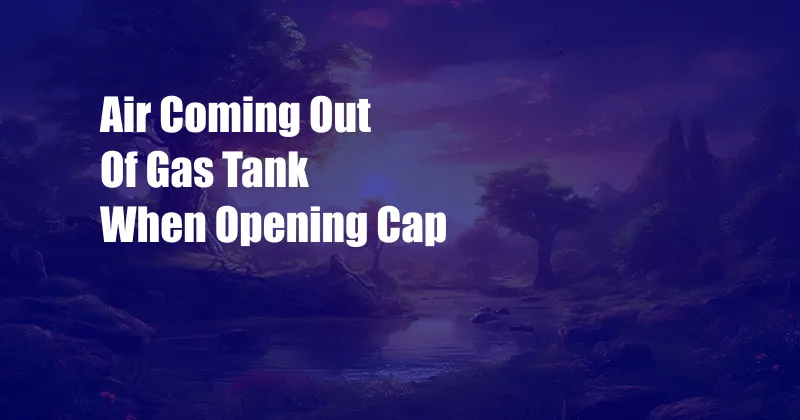
Air Coming Out of Gas Tank When Opening Cap: Causes and Solutions
Have you ever experienced a noisy burst of air escaping from your gas tank when you open the cap? It’s a startling and often puzzling phenomenon that can leave you wondering what’s going on. In this comprehensive guide, we’ll delve into the causes behind this unexpected occurrence and provide practical solutions to resolve it.
This phenomenon, known as “tank burping,” is not an uncommon issue. It occurs when a vacuum forms inside the gas tank, causing air to rush in when the cap is opened. Understanding the reasons behind tank burping will help you address the problem effectively.
Causes of Tank Burping
1. Charcoal Canister Malfunction
A charcoal canister is a component of your vehicle’s emissions control system. It traps and stores fuel vapors emitted from the gas tank, preventing them from escaping into the atmosphere. When the canister becomes saturated or clogged, it can’t absorb the vapors, leading to tank burping.
2. Blocked or Damaged Vent Hoses
The gas tank is equipped with vent hoses that allow air to flow in and out, equalizing pressure. If these hoses become blocked or damaged, they can prevent air from entering the tank, creating a vacuum that results in tank burping.
3. Faulty Gas Cap
The gas cap plays a crucial role in sealing the gas tank and preventing air leaks. A loose, damaged, or improperly installed gas cap can allow air to enter the tank, contributing to tank burping.
4. Overfilling the Gas Tank
Filling the gas tank beyond its capacity can cause excess fuel to spill into the vapor recovery system. This can saturate the charcoal canister and block the vent hoses, leading to tank burping.
Resolving Tank Burping
1. Check the Charcoal Canister
Inspect the charcoal canister for signs of saturation or clogging. If it’s clogged, it may need to be replaced or serviced by a mechanic.
2. Inspect and Clean Vent Hoses
Examine the vent hoses for blockages or damage. Clean or replace the hoses if necessary to ensure proper airflow.
3. Replace the Gas Cap
If the gas cap is loose, damaged, or improperly installed, replace it with a secure and properly fitting cap.
4. Avoid Overfilling the Tank
Always stop filling the tank when the pump automatically shuts off. Overfilling can lead to several issues, including tank burping.
Expert Tips
1. Fuel Additives
Certain fuel additives can help reduce the formation of deposits in the charcoal canister and vent hoses, minimizing the risk of tank burping.
2. Drive Regularly
Driving regularly helps keep the charcoal canister active and prevent it from becoming saturated. If you drive infrequently, it’s recommended to take the car for a short drive once a week or two to circulate the fuel vapors.
FAQs
Q: Is it dangerous to have tank burping?
A: Tank burping is generally not dangerous, but it can be startling and indicate an underlying issue that needs attention.
Q: Can I fix tank burping myself?
A: Simple fixes like checking and replacing the gas cap can be done by yourself. However, more complex issues, such as charcoal canister or vent hose problems, may require professional assistance.
Conclusion
Tank burping is a common issue that can be caused by several factors. Understanding the causes and implementing practical solutions will help resolve this annoyance and ensure the smooth operation of your vehicle. By following the tips and expert advice outlined in this article, you can effectively eliminate tank burping and maintain optimal fuel system performance.
Is this article providing you with valuable information? Please feel free to share your thoughts and questions in the comments section below.